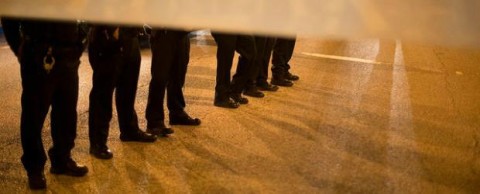Police encounters
When I was in elementary school a local police officer made regular visits to explain to us what police did. The department always sent Sergeant Cal Bell, a genial African American who showed us the exotic equipment he carried: badge, large flashlight, nightstick, handcuffs, and service revolver. He told us that he liked to be called “Cow Bell,” which we kids thought was hilarious. I asked him if he had ever used his revolver. “No,” he said, “I have never shot it in the line of duty, and I hope I never have to.”
When I was 12, police in an unmarked car stopped a friend and me one evening when we were spraying passing automobiles with our new squirt guns. They confiscated our water pistols, drove us to our homes, hauled us up the front steps, and turned us over to our parents.
Read our latest issue or browse back issues.
My adult encounters with the police include a few traffic tickets, one of which was received while I was wearing a clerical collar. I assumed that the collar would inspire sympathy—it didn’t. Then a few years ago I had a flat tire on my bicycle while riding on Chicago’s lakefront bike path. Two police officers, a young woman and young man patrolling on bicycles, rode up as I was trying, unsuccessfully, to repair my tire. I asked if they could help me return home. “We’ll do better than that,” one said, and they removed the wheel, applied a quick patch, and reinflated the tire. I was grateful.
In years of ministry in city churches I always made a point of becoming familiar with the local police station and acquainted with the commanding officer. In Columbus, Ohio, a clinical psychologist who worked with the metropolitan police force told me that police officers are susceptible not only to daily physical danger but also to psychological stress. Being called to intervene in and defuse a domestic conflict, for instance, exacts a toll. The average urban cop, my friend said, experiences the fight-or-flight physical and emotional response several times every day and pays a steep price in stress levels and health.
I am distressed by the recent police shooting and killing of unarmed civilians and, in one incident, the death of a man by an illegal choke hold. In each incident the victim was African American, including a 12-year-old boy brandishing a BB gun (the age I was when police confiscated my water pistol).
Those of us who are white have had to recognize that African-American communities experience and perceive the police differently and are treated differently by the police. While my experience confirms the comforting Chicago police motto, “To Serve and Protect,” many blacks in Chicago likely don’t see it that way at all.
One picture from Ferguson, Missouri, captures the enormous gap in perception. An African-American man in jeans, T-shirt, and backward baseball cap raises his arms in the “don’t shoot” gesture as he backs away from three law enforcement officers in full paramilitary gear. Their automatic weapons are pointed directly at the retreating black man.
Prominent right-wing politicians are attempting to deepen the conflict by blaming the victims. Some police union officers are arguing that there is widespread hostility toward police in general, which there most certainly is not.
Our country needs a national conversation between police and the communities they serve, with an acknowledgment of past inequities, a renewed appreciation for those who serve and protect, and a renewed commitment on the part of the judicial system, including law enforcement, to ensuring that skin color has nothing to do with the way citizens are treated.







